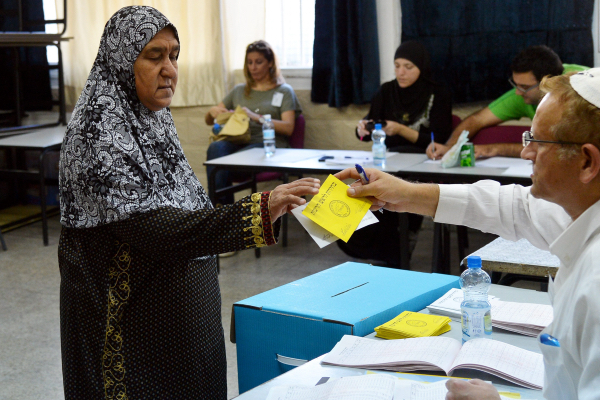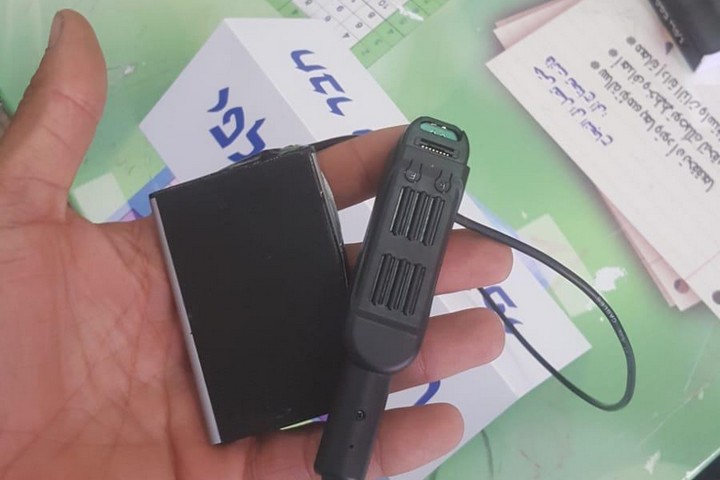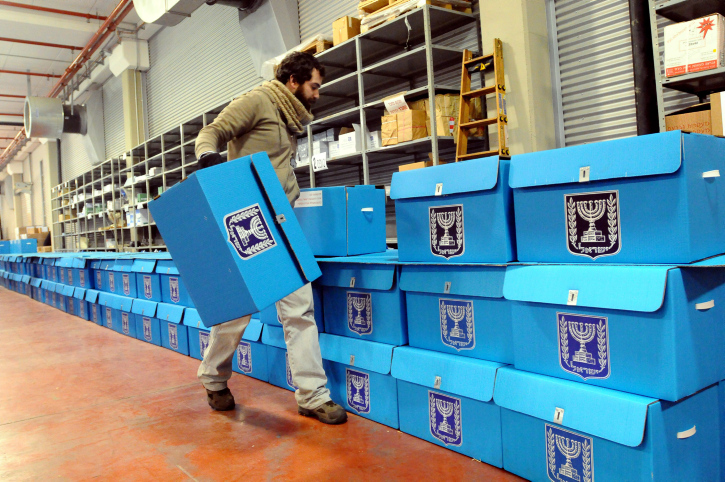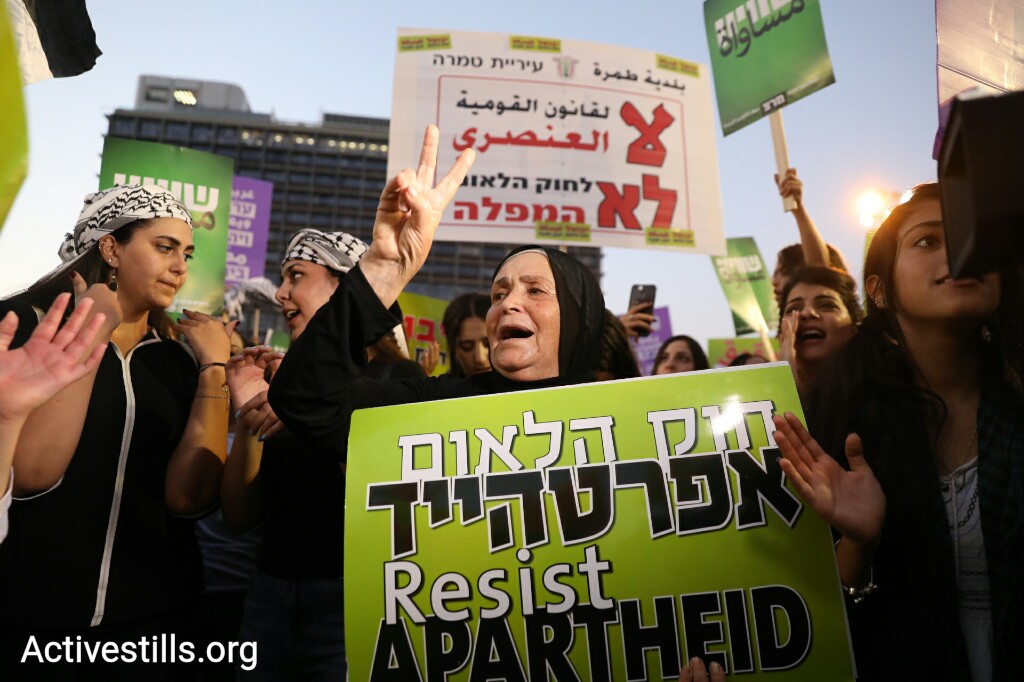Four months after the ruling Likud party led a voter intimidation campaign against Palestinian voters, the government body responsible for ensuring free and fair elections says it hasn’t made any changes to its process.

With just a few weeks before Israeli citizens head back to the polls for the second time this year, the government body responsible for supervising and regulating elections in Israel said it has not drawn any lessons and has not implemented any changes to prevent the repeat of a voter intimidation campaign that targeted Arab Palestinian voters in early 2019.
On April 9, 2019, Election Day, a settler-aligned public relations firm and Prime Minister Benjamin Netanyahu’s Likud party led a voter intimidation stunt specifically targeting Arab Palestinian voters. The Likud sent around 1,300 activists wearing hidden cameras to serve as election monitors at polling stations in Arab cities and towns. Party activists were not sent with hidden cameras to polling places in non-Arab locales.
“Because there were observers on our behalf at every polling station, the [Arab] voting rate dropped by 50 percent – the lowest seen in recent years!” the PR firm, Kaizer-Inbar bragged on its Facebook page a day later.
Election monitors in Israel are either paid by the Elections Committee or are members of political parties. The parties themselves can decide where to send their observers.
With another election approaching in September, the Likud has announced an even broader operation. Civil rights groups are calling the ethnically targeted surveillance operation a clear attempt at voter intimidation and suppression, with some saying it is patently illegal. The Central Elections Committee, meanwhile, has yet to weigh in.
“It’s definitely another alarm raised about the attempt to oppress Arab Palestinians in Israel,” said Gilad Grossman, spokesperson for the Association for Civil Rights in Israel. By targeting voters based on their ethnicity rather than placing cameras in areas where there are suspicions of voter fraud, “you’re basically marking all the Arab population in Israel as potential criminals or potential fraudsters,” added Grossman.
The Central Elections Committee said in late April that it had identified two polling stations with possible irregularities. One of them was in an Arab locality, the other in a predominantly Jewish city.
“This is racial profiling against Arabs. It’s unacceptable, and shouldn’t be permitted,” concurred Sawsan Zaher, deputy general director and an attorney at Adalah — The Legal Center for Arab Minority Rights in Israel. Filming at polling stations is a violation of Article 119 of the Knesset Elections Law, which prohibits disturbances to the proper order of elections or any attempts to interfere with a voter’s right to vote, said Zaher.
There are no Israeli laws that explicitly regulate the use of cameras at polling stations.
Asked by +972 Magazine whether the Central Elections Committee will be taking any punitive measures against those behind the attempted voter intimidation, Giora Fordes, a spokesperson for the committee, responded: “Who intimidated [voters]?”

With regards to whether the committee had conducted an investigation into or learned any lessons from the April elections, Fordes said that, given the short period between the end of elections for the 21th Knesset on April 19 and the declaration of new elections on May 29, “it was not possible to incorporate lessons learned.”
Shortly after hidden cameras were discovered on Election Day last April, several Knesset members, primarily Palestinian candidates and legislators, approached Supreme Court Justice Melzer, who heads the Central Elections Committee, asking him to immediately prohibit the use of cameras at polling venues.
Melzer did initially order the cameras removed, although a few hours later authorized their use in “exceptional” cases where the integrity of the vote or the proper order of elections were under threat. Melzer also wrote that, as long as the cameras aren’t filming inside the voting booth, the presence of cameras in polling stations did not infringe on the voters’ right to privacy.
That has not always been the case. Former Justice Elyakim Rubinstein, who oversaw elections to the 19th Knesset, justified the removal of a monitor from his post because they had been photographing voters without their permission. This act, he concluded, violated the right to privacy of citizens exercising their right to vote.
Whether the cameras are placed inside the private voting booth or not is beside the point, said Zaher: their very existence inside polling stations, “where people walk in, submit their ID cards, and cast their ballots,” is a violation of the law. To Zaher, the videos released on social media that day clearly show how placing cameras at polling stations is a disturbance. They led to tense discussions at the voting venues that almost entirely sidelined the elections.

Adalah has sent a letter to the attorney general demanding that Likud deposit the cameras with the his office. “Everything documented by the cameras is considered primary evidence, which is extremely important for a criminal investigation,” she said.
Attorney General Avichai Mandelbit has yet to respond to Adalah’s letter but he is slated to present his recommendation at an upcoming meeting the CEC is holding on the matter.
For Tomer Naor, an attorney with the Movement for Quality Government in Israel, “every camera that you see in polling stations is intimidation, especially if it’s held by an activist with a political party.”
Even if there’s suspicion of voter fraud, he added, it should be the government’s job to observe and supervise these incidents, not that of political “militias,” a position the Movement for Quality Government will be advocating for at the upcoming CEC discussion. The organization will also advise the committee to outlaw cameras at polling stations and criminally charge those caught filming at polling stations, he added.
Likud has stated that the goal of its surveillance operation is to account for voter fraud in Arab communities. Naor is not convinced: “It’s nice to wrap this [intimidation campaign] with an excuse of trying to defend the integrity of elections,” but the racist motivations of the people behind the campaign are clear, he said.
“We got a few complaints from civilians within Arab society saying that some of them didn’t vote because they were afraid,” continued Naor, referring to the statement by the PR firm behind the campaign boasting of voter intimidation.

The turnout rate among Palestinian voters in the April 2019 elections was the lowest in decades, at less than 50 percent. Because of several other factors, primarily the passage of the Jewish Nation-State Law and anger over the dissolution of the Joint List slate of Arab parties, however, it would be difficult to point to a single reason for the drop in turnout.
In the United States, election laws vary state by state, said Julie Ebenstein, senior staff attorney with the ACLU’s Voting Rights Project, but in most cases cameras are prohibited in polling stations. “Certainly if someone were using a camera to try to intimidate people, that would not be permitted in the polling place,” she added.
Ebenstein explained that the difference between voter intimidation and voter suppression depends on what the activity is and who is carrying it out: voter suppression concerns laws that states pass to make voting more difficult for certain groups, while voter intimidation relates to actions of private individuals who are trying to keep certain populations from casting their ballots.
It is those communities that are already vulnerable in society that also tend to be more susceptible to these intimidation campaigns, she added.
There can certainly be overlap between intimidation and suppression attempts, said Ebenstein, where state actors “don’t have to actually prohibit somebody from casting a ballot if they can create enough confusion, enough concern, enough fear within a population.”
“Both are problematic assuming we all want to have a more robust, inclusive electorate and voting process,” she said.
Editor’s Note: Following the publication of this article, the CEC announced it will be meeting on August 8, earlier than originally scheduled, to discuss the use of cameras at polling places.


